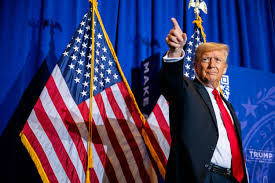Why would anyone vote ANC, given the party's record of corruption followed now, under President Cyril Ramaphosa, by division, bitter in-fighting and deadlock? It is more a mystery than a question, considering the negative coverage the ANC gets in the media.
Most regular journalists seem to avoid exploring
it. They may feel it somehow undemocratic, even running a risk, to argue there is no real option. Or they know perhaps they can rely on the social media these days to come up with an answer.
On Twitter and in the comment columns of news and political websites, explanations are never lacking: people who vote ANC either have their noses in the trough or are looking to have their noses in the trough. Alternatively,
they have been bought or are unintelligent. There are many learned exchanges on
the proof furnished by IQ tests.
There’s no doubt some truth in it all, as in politics
everywhere. But like all generalities, it also makes one wonder. Is there
really no hope, not an honest ANC man or woman anywhere? Not in the Revenue, for
instance? Not speaking out at the Zondo Commission? And can’t the people - the
voters - vote ANC simply because they want to or choose to? Is that really the
same as being stupid?
Another popular explanation is people vote ANC because of identity politics, sometimes termed identitarian politics to make the matter weigh more significantly. Liberals tend to bridle at this, seeing it as a threat if not racist, and they may have a point. All politics is identity politics because there
has to be a sense of mutual identity to identify with anything. There is the consideration too, since the population of SA is 80% black, that the majority can
hardly avoid colouring the party they vote for.
That leaves the President Cyril Ramaphosa factor, the New Dawn that he promised South Africans, but which, the ubiquitous doomsayers insist, is a False Dawn.
This piece, however, is not to get into that debate yet again, to claim that Mr Ramaphosa may or may not be trusted, or
that he is weak and not moving fast enough. It is to put another view entirely.
There appear to be three reasons people vote - or
don’t vote - as they do: habit, loyalty and reason.
Habit, a very powerful human instinct/motivator,
is clearly at work in people who vote for the same party all their lives -
because their parents did, or the local community does, or because they just
can't ever be bothered. These include those who 'don't trust politicians'
and it also explains those who don't vote at all, and why they often are the
ones that grumble most at the terrible state of affairs.
It's like putting the cap back on the toothpaste:
you either do or you don't.
Loyalty is hard to tell apart from habit and no
doubt often overlaps with it, but it may be a more elevated form of behaviour,
or more stupid, depending, ironically, on your loyalties.
Loyalty seems straightforward enough: we
naturally take sides and, having taken them, we stick with them come what may;
it may be related to not wanting to be proved wrong. It generally has little to
do with logic and nothing whatever to do with right and wrong and it is
therefore puzzling why people sneer at others who stick with a particular
political party or politician, when they themselves never desert their
favourite soccer or rugby team however often it disappoints.
Then there's reason. Now that's the hard one. We
all have Reason; that stands to reason. We think that anyone capable of reason would never vote ANC. In the same way, we reason no one would ever vote DA and anyone who votes for Donald Trump has taken leave of their senses. Yet there are people
who do it, who would vote Hitler or Stalin still, or Barak Obama, or Emmanuel Macron and give you reasons for it. After all, people even vote for Nigel Farage.
Reason, the organising principle of democracy, is
as deceptive a guide as any other. It does not lead us all to do the right
thing or the best thing. And it definitely doesn't make us all do
the same thing.

